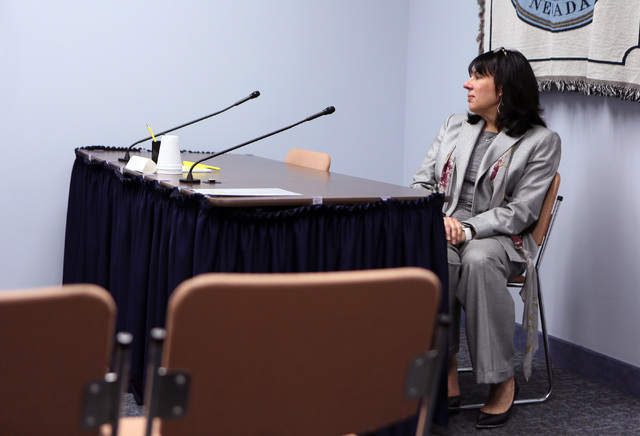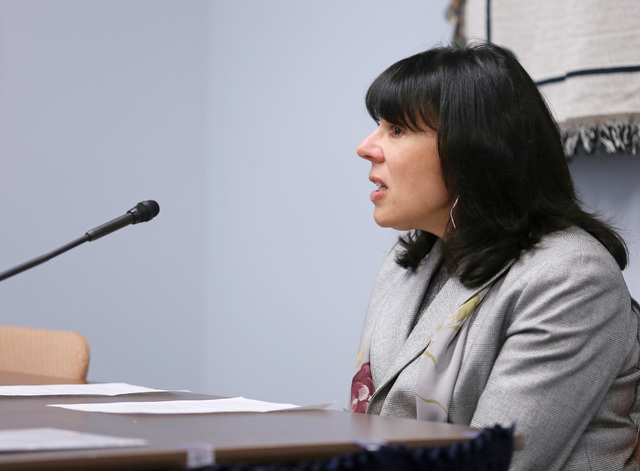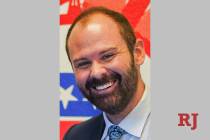Las Vegas woman seeks ‘Right to Try’ drugs for ailing father
CARSON CITY — A Las Vegas woman whose 86-year-old father is facing a terminal illness testified in favor Friday of a “Right to Try” bill that would make it easier for him to obtain a medication that could help prolong his life.
Elayna Youchah, an attorney, testified from Las Vegas in support of Assembly Bill 164, which would make it easier for those threatened with a life-ending illness to seek potential remedies that have not received final approval from the Federal Drug Administration.
“My father loves life,” she said. “He wants to live.”
The bill, sponsored by Assemblyman James Ohrenschall, D-Las Vegas, was heard by the Assembly Health and Human Services Committee, which did not take immediate action on the measure. No one spoke in opposition to the bill.
Youchah said there is a drug going through trials in Arizona and California that might help her father, Michael Youchah, live longer and have a better quality of life. He suffers from a form of incurable blood cancer called multiple myeloma and has just about exhausted all of his treatment options.
The drug, which is in a Phase III trial, is not available to him, however, she said.
Elayna Youchah said the bill would eliminate any potential criminal penalty if a physician prescribed a drug that has not yet been licensed by the FDA. It would also change Nevada law to make such drugs available in the appropriate circumstances. Nevada law currently prevents it, she said.
Youchah said her father’s disease is an extremely painful form of cancer but he never complains.
In a telephone interview before the hearing, Youchah said the bill is important not only for her father but for the many people who fight and struggle to find treatments for their life-threatening illnesses.
“There should be a point at which individuals facing certain death have access to these drugs,” she said.
Youchah said her father was considered for a trial for the drug in Arizona but was not accepted. He is now too ill to travel, she said. If the drug was made available, Youchah said her father has an excellent physician in Las Vegas who could administer it.
“Unfortunately, it is not,” she said.
Despite his illness, Michael Youchah continues to enjoy life and activities in Sun City with his wife, Marjorie, Elayna Youchah said.
Ohrenschall said there exists a compassionate use exception to allow access to such drugs, but only a few hundred such exceptions are granted each year while annually there are tens of thousands of diagnoses of terminal cancer.
“To me that is unacceptable,” he said.
The FDA compassionate use provision allows companies to provide experimental drugs on a case-by-case basis. It is not limited to the terminally ill. There is also no mandate for a company to participate.
Assemblywoman Robin Titus, R-Wellington, who is a physician, said the legislation does appear to provide safeguards for consumers.
“Conceptually I’m good with this,” she said.
But Titus expressed concern that the measure would allow the company developing the drug to recoup its costs in making it available under the law.
It should not be restricted only to those with financial resources, she said.
Craig Handzlik, state policy coordinator for the Arizona-based Goldwater Institute, which developed and has been advocating for the legislation around the country, said the intent was to allow recovery of the costs for a dose provided to a patient, not a portion of the development costs for an experimental drug, which can run to $1 billion.
Handzlik said five states have adopted the “Right to Try” legislation, including Arizona, where it was put on the ballot. It passed in November with nearly 80 percent of the vote. Other states approving the law are Colorado, Missouri, Louisiana and Michigan.
Ohrenschall said the law has only recently been enacted by a few states, so it is too soon to assess some concerns, such as whether it could adversely affect a physician’s malpractice insurance rates.
But there are critics of the legislation.
In an interview with the Review-Journal in August, New York University bioethics professor Arthur Caplan called the legislation the “right to beg” law because it provides no resources for individuals who might seek treatment under its provisions.
The Goldwater Institute said more than 1 million Americans die each year of terminal illness, and it takes more than a decade to bring a new drug to market.
With fewer than 3 percent of the sickest patients able to access drugs through clinical trials, thousands of Americans are dying each year unable to access potentially life-saving medicines, the group said.
































